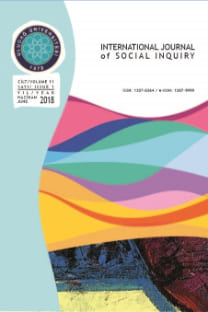ADİL DÜNYA İNANCI ÜZERİNE BİR POLEMOS
Adalet, Adil Dünya İnancı, Değerlendirme, Sürü Ahlakı, Değer Dünyaları
A POLEMOS ON JUST WORLD BELIEF
Justice, Just World Belief, Evaluation, Herd Morality, Worlds of value,
___
- Bastounis, Marina; Minibaş Poussard, Jale (2012). “Causal Attributions of Workplace Gender Equality, Just World Belief, and the Self/Other Distinction”. Social Behaviour and Personality, 40, 433-452.
- Correia, Isabel; Dalbert, Claudia (2007). “Belief in a Just World, Justice Concerns, and Well-Being at Portuguese Schools”. European Journal of Psychology of Education, 22, 421- 437.
- Correia, Isabel; Kamble, Suresh; Dalbert, Claudia (2009). “Blief in a Just World and Well-Being of Bullies, Victims and Defenders: A Study with Porteguese and Indian Students”. Anxiety, Stress & Coping, 22, 497-508.
- Dzuka, Jozef; Dalbert, Claudia (2006). “The Belief in a Just World and Subjective Well-Being in Old Age”. Aging & Mental Health, 10, 439-444.
- Kant, Immanuel (2007). “Idea for A Universal History with A Cosmopolitan Aim”. Anthropology, History and Education: The Cambridge Edition of the Works of Immanuel Kant, Günter Zöller; Robert B. Louden (Eds.), 107-121, UK: Cambridge University Press.
- Kuçuradi, Ioanna (2009). Nietzsche ve İnsan. Ankara: Türkiye Felsefe Kurumu.
- Lerner, Melvin J. (1980a). The Belief in a Just World A Fundamental Delusion. Newyork: Springer Science.
- Lerner, Melvin J. (1980b). The Belief in a Just World: A Fundamental Delusion. New York: Plenum Press.
- Lerner, Melvin J. (1977). “The Justice Motive: Some Hypotheses as to its Origins and Forms”. Journal of Personality, 45, 1-52.
- Lerner, Melvin J.; Miller, Dale T. (1978). “Just World Research and the Attribution Process: Looking Back and Ahead”. Psychological Bulletin, 85, 1030–1051.
- Lerner, Melvin J.; Simmons, Carolyn (1966). “Observer’s Reaction to the ‘Innocent Victim’: Compassion or Rejection?”. Journal of Personality and Social Psychology, 4, 203–210.
- Lucas, Todd; Alexander, Sheldon; Firestone, Ira; Lebreton, James M. (2008). “Just World Beliefs, Perceived Stress, and Health Behavior: The Impact of a Procedurally Just World”. Psychology and Health, 23, 849-865.
- Murray, John D.; Spadafore, Jo Ann; McIntosh, William D. (2005). “Belief in a Just World and Social Perception: Evidence Forautomatic Activation”. Journal of Social Psychology, 145, 35–47.
- Nietzsche, Friedrich (2016). İyinin ve Kötünün Ötesinde. Çev. Mustafa Tüzel, İstanbul: İş Bankası Kültür Yayınları.
- Nietzsche, Friedrich (2015). Böyle Söyledi Zerdüşt. Çev. Mustafa Tüzel, İstanbul: İş Bankası Kültür Yayınları.
- Nietzsche, Friedrich (2011). Ahlakın Soykütüğü. Çev. Zeynep Alagonya, İstanbul: Kabalcı Yayınları.
- Nietzsche, Friedrich (2005). Putların Batışı ya da Çekiçle Felsefe Nasıl Yapılır. Çev. Mustafa Tüzel, İstanbul: İthaki Yayınları.
- Nietzsche, Friedrich (2003). Şen Bilim. Çev. Levent Özşar, Bursa: Asa Kitabevi.
- Öcel, Hatem (2011). “İşyeri Zorbalığı ve Fiziksel Rahatsızlık Belirtileri: Adil Dünya İnancının Düzenleyici Rolü”. Türk Psikoloji Yazıları, 26, 76-86.
- Thévenot, Laurent; Boltanski, Luc (2006). On Justification, The Economics of Worth. New Jersey: Princeton University Press.
- http://www.etimolojiturkce.com/kelime/adil (Erişim Tarihi 12.01.2017).
- http://www.tdk.gov.tr/index.php?option=com_gts&arama=gts&guid=TDK.GTS.5881c6e9375785.26073828 (Erişim Tarihi 12.01.2017).
- ISSN: 1307-8364
- Yayın Aralığı: 3
- Başlangıç: 2008
- Yayıncı: BURSA ULUDAĞ ÜNİVERSİTESİ > SOSYAL BİLİMLER ENSTİTÜSÜ
TWEETLERİN ETKİNLİĞİNİN SOSYAL AĞLAR İLE İRDELENMESİ
YUSUF MURAT KIZILKAYA, AYŞE OĞUZLAR
TÜRKİYE’DE KİŞİSEL GELİŞİM YAZININA ÇEVİRİBİLİM AÇISINDAN BİR BAKIŞ
TÜRKİYE’DE DEVLET ÜNİVERSİTELERİNİN FAALİYET RAPORLARI ARACILIĞIYLA HESAP VERME YÜKÜMLÜLÜĞÜ
TURİST REHBERLİĞİ MESLEK KURULUŞLARININ WEB SİTELERİNİN İÇERİK ANALİZİ YÖNTEMİYLE DEĞERLENDİRİLMESİ
Selin MANAV, HASRET ULUSOY YILDIRIM, ÖZLEM KÖROĞLU
KÜRESEL POLİTİK SİSTEMDE LİDERLİK: GEORGE MODELSKİ VE DÜNYA POLİTİKASINDA UZUN DÖNGÜLER
İLK ÇAĞ UYGARLIKLARINDA DİPLOMASİ
Ulaş Töre SİVRİOĞLU, MUZAFFER ERCAN YILMAZ
EDEBİYAT SOSYOLOJİSİNİN SINIRLARI
ADİL DÜNYA İNANCI ÜZERİNE BİR POLEMOS
ARZU GÜL TOPUZ, ONUR UCA, METİN TOPUZ
KAYNAK TÜKETİM MUHASEBESİNİN GELİŞİM SÜRECİ, MALİYET AVANTAJLARI VE TEORİK BİR UYGULAMA
